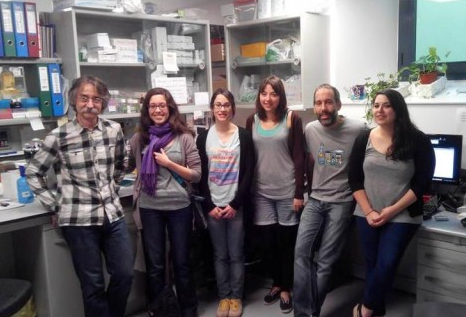25.05.2014 - 11:34
Researchers from the University of Barcelona (UB) and the Catalan capital’s CELLEX Biomedical Research Centre (IDIBAPS-UB) have found the essential role played by cholesterol in cell mobility and tissue invasion, which also means its role in cancer propagation. In fact, this research, led by Professor Carles Enrich, is a key study for better understanding of cancer metastasis – the process in which cancer cells invade healthy tissues – and progresses the discussion on the relationship between cholesterol levels and cancer incidence. The paper is published in open access ‘Cell Reports’. In short they found that the so-called “bad” cholesterol (LDL cells) promotes cell mobility while “good” cholesterol (HDL cells) avoids cell propagation. The study opens new therapeutic paths to blocking cancer metastasis.
A group of researchers led by professor Carles Enrich, Chief of IDIBAPS’ Endocytosis and Protein Intracellular Transit team and member of Cellular Biology, Immunology and Neurosciences UB Department have identified that the accumulation of LDL cholesterol cells – the one carried by low-density lipoproteins (“bad cholesterol) – may play a crucial role in promoting cell mobility. On the contrary, high levels of HDL cholesterol –the one carried by high-density lipoproteins (“healthy cholesterol) – may avoid cell propagation.
Researchers from Australia and Germany also participated in the study
Daniel Grinberg and Lluïsa Vilageliu, from the Department of Genetics of the UB’s Faculty of Biology, and Joan Blasi, from the Department of Pathology and Experimental Therapy of the UB’s Faculty of Medicine, participated in the paper, published in the journal ‘Cell Reports’. Researchers from Sydney’s Garvan Institute of Medical Research and the University of Sydney (Australia), as well as from Queensland University of Technology (Brisbane, Australia) and the University of Hamburg (Germany) also participated in the study.
The research focused on the role cholesterol plays within the cell, not in the blood
The study was developed by means of experiments carried out with cell cultures of patients with Niemann-Pick disease. These people present a rare genetic anomaly that causes cholesterol accumulation in the cell, which produces different motor and neurological disorders. “It is generally thought that cholesterol, one of the most important lipids in our body, is in the blood; but few people ask themselves what cholesterol does in the cell”, points out Carles Enrich. “Cholesterol – adds the researcher – performs different functions in the cell. Besides being crucial to produce membranes, it also regulates vesicular trafficking. Now, it has been proved that cholesterol plays a key role in the regulation of other mechanisms, for instance cell mobility and propagation and, therefore, it is a crucial factor in metastasis”.
Cholesterol controls molecules in the cell surface, affecting cell mobility
Most cells in our body bind other cells by means of integrins, molecules that act as bridges located at the cell surface. UB researchers explored how integrins move in the cells and discovered cholesterol’s key role. Professor Enrich points out that “in the cell, cholesterol controls the trafficking of vesicles, which are responsible for transporting integrins to the cell surface. Cholesterol depletion in the trans-Golgi network interferes with integrin trafficking, which has direct repercussions on cell migration”.
New knowledge about the mechanisms of cancer metastasis
The study provides new therapeutic options for controlling metastasis and points out a strategy to be applied to cancer patients who also have cholesterol disorders. “It must be considered that the drugs prescribed to regulate cholesterol may modify cell migration ability. Therefore, progress in personalized therapy is absolutely important”, highlights Professor Enrich.
Now, the challenge for researchers is to understand why cholesterol stays in the cell. “We want to study what endosome membrane mechanisms block intracellular traffic and hold cholesterol and their negative consequences for our health”, concludes Carles Enrich.



